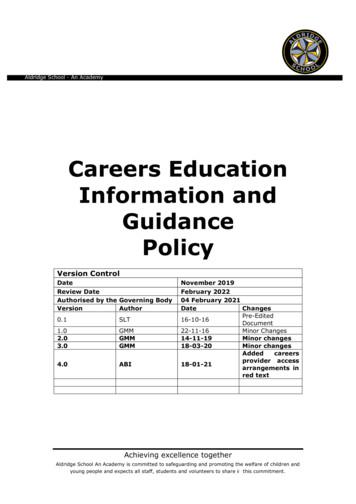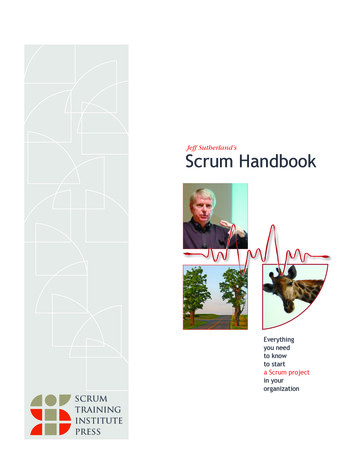Modernising Scientific Careers - NSHCS
ModernisingScientific CareersThe UK Way Forward
DH INFORMATION READER eClinicalEstatesCommissioningIM & TFinanceSocial Care/Partnership WorkingDocument purposePolicyGateway reference13494TitleModernising Scientific Careers: The UK Way ForwardAuthorUK Health DepartmentsPublication date26 February 2010Target audiencePCT CEs, NHS Trust CEs, SHA CEs, Foundation TrustCEs, Medical Directors, Directors of PH, Directors ofNursing, NHS Trust Board Chairs, Directors of HR,Directors of Finance, Allied Health Professionals, GPs,Communications Leads, Employers across the UK; TradeUnions; Healthcare Science Departments and HealthcareScientists; Healthcare Science Professional Bodies HEand FE Providers; Private Sector Healthcare providers;Education Funders across the UK; Medical RoyalColleges; Universities UK; Council of Deans; Heads ofMedical SchoolsCirculation listAs aboveDescriptionThe document informs key stakeholders of the strategyfor the development of Healthcare science workforceand their education and training as initially outlined in AHigh Quality Workforce. It sets out how it is intended totake forward proposals on career pathways, regulationand standards of education and training, education andtraining programmes and on supporting delivery.Cross referenceHigh Quality Care for All, NHS Next Stage Review FinalReport June 2008 (Gateway Ref: 10106)Superseded documentsThe Future of the Healthcare Science Workforce,Modernising Scientific Careers:The Next Steps AConsultation (Gateway Ref: 10913)Action requiredN/ATimingN/AContact detailsProfessor Sue Hill, Chief Scientific OfficerDepartment of HealthRoom 526BRichmond House79 WhitehallLondon SW1A 2NSAccess at: www.dh.gov.uk/csoFor recipient’s use
The Case for ChangeModernising Scientific CareersThe UK Way ForwardContents Executive summary3Supporting delivery24 Overview5 What we said in our consultation document25 What we heard from the consultation9 Our assessment26 30 What we heard from the consultation11 Conclusion12 Annex 1: The consultation process13 Our assessment14Regulation and standards of educationand training16 What we said in our consultation document16 What we heard from the consultation17 Our assessment17 Training and education programmes19 What we said in our consultation document20 What we heard from the consultation20 Our assessment22 The case for changeCareer pathwaysWhat we said in our consultation document27 31 Annex 2: Illustrative career pathways32 Annex 3: Glossary of terms52
Modernising Scientific CareersThe UK Way ForwardExecutive summary 1 The healthcare science workforce plays a centralrole in safe and effective patient care across allpathways of care from health and wellbeing toend of life. It comprises approximately 5% ofthe healthcare workforce in the UK, and 80%of all diagnoses can be attributed to their work.2 Scientific and technological advances arebeing developed all the time. These provideopportunities to improve the quality of care forpeople at all stages of their lives. The way care isdelivered is also changing, with new models ofintegrated care emerging for people in differentcare settings. Roles for the healthcare scienceworkforce are changing as a result. We need tomodernise scientific careers to equip staff withthe right set of knowledge and skills for 21stcentury care and the changing demands.3 We need to simplify career structures andeducation and training for the healthcarescience workforce to a common framework.This will mean that career pathways are morealigned with other healthcare professionalsand more transparent for those already inthe workforce or thinking of entering it. Weneed the training and education framework toprovide greater flexibility in skills and knowledgedevelopment, with less emphasis in initialtraining on uni disciplinary experience.4 We need to identify, in light of changes wewill be making through Modernising ScientificCareers, any regulatory implications. Anyrecommendations we make on regulation willreflect the principles and recommendations inthe report of the UK Extending ProfessionalRegulation Working Group and the Council forHealthcare Regulatory Excellence (CHRE) Reportand will be proportionate to risk.5 We need to improve workforce planning forhealthcare science, to become more stronglydriven by and integrated with service needs,informing commissioning of educationand training, and supporting re profiling ofthe workforce. These changes can achievesignificant improvements in value for money aswell as quality of care.p3
Executive SummaryModernising Scientific CareersThe UK Way Forward6 Overall, there has been broad support for theproposals we set out in November 2008 and insubsequent deliberative events for ModernisingScientific Careers. We now set out here theway forward for action across all four countriesof the UK, taking account of what we heardduring the consultation. The key changes are:introduction of a new simplified healthcareÆÆscience pathway, with roles defined alongthe Healthcare Science Career Frameworkone to nine,ÆÆidentification of regulatory implications fromModernising Scientific Careers, proportionateto risk,ÆÆdevelopment of new training and educationprogrammes, including academic andworkplace-based training, with associatedawards and qualifications clearly defined orarrangements for assessment of equivalenceclearly set out,ÆÆsupporting delivery through newcommunication strategies, further workon employment aspects, improvedworkforce planning, improved educationcommissioning, and transparent, sustainablefunding arrangements that are fit forpurpose and offer value for money.7 The timetable for change will be set out inseparate implementation plans for each country,including transition arrangements and processesfor evaluating successful delivery. Throughoutthe next phase of change, we will continue towork in partnership with our key stakeholdersto ensure effective delivery.8 These proposals will ensure we have asustainable fit for purpose scientific workforcefor the future that is affordable, builds upon thepast and ensures that patients and the publicbenefit from their skills and talents.Professor Sue HillChief Scientific Officer, Department of HealthDiane TaylorActing Director of Human ResourcesProfessor Bernie HanniganChief Scientific AdviserDepartment of Health, Social Services andPublic Safety, Northern IrelandMs Jacqui LundayChief Health Professions Officer,Scottish GovernmentDr Owen CrawleyChief Scientific Adviser (Health),Welsh Assembly Governmentp4
Modernising Scientific CareersThe UK Way ForwardOverview1 The healthcare science workforce is at theheart of safe and effective care for patients,working across some 51 disciplines. It providesexpert diagnostic advice and therapeutic carefor the treatment of patients and preventionof disease. The workforce develops and appliesnew technologies that help improve the care ofpeople, including those in priority groups suchas older people, women, and children, patientswith mental health problems and the acutely ill.They are central to developing high quality carefor all.2 Although constituting only 5% of thehealthcare workforce in the UK, 80% of alldiagnoses can be attributed to their work. Thiscontribution is across all clinical pathways fromprevention and early life through to acute andend-of-life care.3 Roles are changing as developments in scienceand technology bring new opportunities todiagnose and treat patients more effectivelyand efficiently in different care settings. Thechanges we will introduce through simplifiedcareer structures, new education and trainingprogrammes and review of regulation willensure that the healthcare science workforce isequipped with the right up-to-date knowledgeand skills to care for patients in the 21st century.4 In November 2008, the UK Health Departmentspublished for consultation The Future of theHealthcare Science Workforce. ModernisingScientific Careers: The Next Steps. Thedocument set out proposals to ensure that theworkforce was educated and trained to meetthe challenges of modern healthcare, consistentwith policy proposals across the four countries.It addressed the need to:ÆÆmeet future service needs by ensuringscientific and technological advances areincorporated into emerging models ofintegrated careÆÆprovide an improved approach to workforceplanning and development of an appropriateskill mixÆ bring the education and training of thehealthcare science workforce more into linewith that of other healthcare professionalsp5
OverviewModernising Scientific CareersThe UK Way ForwardÆÆcreate clear career pathways and educationand training programmes in a commonframework for the whole of the scientificworkforceÆÆensure the focus in education and trainingprogrammes is on training and enhancingthe training experience rather than ontrainees being required to deliver serviceÆÆinclude greater flexibility in skill andknowledge development in initial training,rather than an emphasis on extensiveuni-disciplinary experience.5 The consultation closed on 6 March 2009.We received nearly 1,000 responses fromorganisations and individuals in England,Scotland, Wales and Northern Ireland. (Adescription of the consultation processis in Annex 1). The responses have beenindependently analysed. A summary report1of the responses is published alongside thisdocument.The Vision for Healthcare Science‘The vision for healthcare science is of a worldclass workforce integral to multi-professionalteams delivering high quality innovativepatient care, in a range of settings deliveringexcellence in knowledge creation, innovationand service improvement leading andembracing research and development andcontinually evaluating clinical practice and caredelivery models.’The Future of the Healthcare ScienceWorkforce. Modernising Scientific Careers:The Next Steps, published November 20086 Overall, there is support for the direction oftravel proposed and our vision for healthcarescience. However, people asked for more detailon how change will be implemented andfunded. Some raised concerns over aspectsof the training and education model, thelinks between regulation and training, and1p6employment implications. These all neededfurther clarification.7 Since the consultation closed, we have helddeliberative events to think through the detail ofour approach and address areas where concernsremained. These views have helped inform whatwe now set out for the implementation phaseof this major programme of modernisation.8 Many recognised that our proposals areabout more than education and training. Thehealthcare science workforce plays an importantrole in adding value to patient care and qualityoutcomes. Healthcare science can improveaccess for patients to healthcare, particularlythrough the provision of diagnostic services.The healthcare science workforce can take onclinical leadership roles and contribute to newclinical pathways and models of integratedcare as well as to innovation in healthcare. Thechanges can contribute to the transformationalchanges required by patients of the healthcaresystem across the UK.9 Many respondents, in all four UK countries,emphasised the importance of ensuring thathealthcare science is seen as an attractiveprofession at the forefront of innovation indiagnostics and treatment. People supportedthe proposals for better communications toraise the profile of this often unrecognisedprofessional group and improve understandingof the central role of healthcare science in thedelivery of modern, evidenced based care forpatients.10 They saw significant benefits in a cleardescription of opportunities for awards andqualifications at all levels, linked to careerprogression and continuous professionaldevelopment. They also saw significant benefitin the integration of career pathways withopportunities for research and innovationtraining to help bring new therapies anddiagnostic techniques quickly into clinicalpractice.Modernising Scientific Careers: A Consultation Analysis of Organisational, Individual and Deliberative Event Responses (conducted for theDepartment of Health) September 2009. Ipsos MORI Social Research Institute.
OverviewModernising Scientific CareersThe UK Way Forward11 Respondents generally agreed with the need forgreater flexibility between healthcare sciencedisciplines but had some concerns that theright balance had not yet been struck betweenthe necessary broad-based knowledge inearly training and subsequent specialisation.This partly reflected the current approach todeveloping experience as well as skills andknowledge during the initial training period. Theratio between specific and broad based trainingmight need adjustment, with more emphasison specialisation so that those working inhealthcare science could practise safely, withless supervision, on completing education ortraining.12 People recognised that while some newtechnologies required specialist knowledge, abroad knowledge base was also needed to beable to respond to the changing way in whichpatients expect services to be delivered andchanging patient demographics themselves. Thisincluded the growing role of community basedservices and increasing numbers of people livingwith long term conditions. Respondents alsostressed that training and education shouldbe adaptable. Some respondents suggestedan accredited modular approach to create aworkforce that can take advantage of the rapiddevelopments in scientific and technologicaladvances and new models of care. Others feltthat some disciplines were already achieving theappropriate degree of specialisation throughtried and tested training programmes andregulation to the benefit of patients. Introducinggreater flexibility should not undermine theseareas of strength.13 Respondents voiced strong and widespreadsupport for the introduction of formal awardsand qualifications for Healthcare ScienceAssistants (HCSAs). They also gave generalsupport to a Practitioner Training Programme(PTP) but wanted to know how more specialisttraining for particular job roles would beachieved. People also asked for more detail onhow the equivalence of prior knowledge andspecialist experience would be assessed for entryat each level and how this would relate to theEuropean Qualification Recognition Agreement.14 There was strong support for Higher SpecialistScientist Training (HSST) as an important part ofworkforce development allied to clearer careerpathways, leading to opportunities to competefor Consultant Healthcare Scientist posts. HSSTwas seen as providing greater potential forcontinuing scientific contribution and expertise,rather than having to switch into managementbased roles. There were some concerns thatthe potential length of training for HSST mightdeter applicants, particularly given the limitednumber of consultant posts available. Some alsowanted more clarity on the demonstration ofequivalence for existing staff.15 Respondents saw regulation as importantto patient safety and quality of care. Peoplewanted to see early progress in the introductionof regulation of those groups that had alreadybeen recommended by the Health ProfessionsCouncil to government for statutory regulation.They also asked for greater clarity on howtraining would relate to regulation, the levelat which regulation would need to apply, andfor more detail on transition arrangements andprotected titles.16 Respondents raised employment issues,including how Agenda for Change would beapplied in implementing the changes. Peoplewanted to understand more clearly securityof tenure, proposals for supernumerary postsand how equality of opportunity wouldbe safeguarded in competitive entry andcareer progression at each level. A numberof respondents also raised the need for localopportunities to ‘grow your own’ to meetparticular local service needs.17 A significant number of respondents said thatit would be important to ensure that the mostappropriate techniques and equipment wereused during training. This might have fundingimplications. People generally asked for moredetail on funding arrangements and timescalesfor implementation.18 Based on what we have heard, we believe thata common approach across all four countriesin our model for training and education, anda review of the regulation of the healthcarep7
OverviewModernising Scientific CareersThe UK Way Forwardscience workforce are needed. We need toaddress concerns over the detail of the model.We need to do further work to set out clearlyhow changes will be resourced, the timetablefor change and the way we will now takeforward modernisation in partnership withhealth service bodies, employing bodies, tradesunions, professional bodies, higher educationinstitutions, regulatory bodies and others,including, importantly, users of the service.19 The following chapters set out what we proposeto do on career pathways, regulation andstandards of education and training, trainingand education programmes and on supportingdelivery. This includes work on mobilisinghealthcare science expertise in the delivery ofhigh quality, safe and effective patient care,raising the workforce profile, developingleadership, addressing skill mix and employmentissues, improving workforce planning andeducation commissioning and clarifyingfunding. We set out what we heard on theseissues and our approach to further engagementto take forward the modernisation process.p8
Modernising Scientific CareersThe UK Way ForwardThe casefor change1 In the consultation, we said we wantedto modernise scientific careers to benefitpatients, employers, workforce planners,commissioners and staff. Patients would get themost appropriate scientific and technologicalapproaches to their care, as staff would havethe right level of up to date knowledgeand expertise. Patient safety and quality ofcare would be further safeguarded throughappropriate professional regulation. Employerswould be able to plan and use their workforcemore easily, with more flexibility betweendisciplines and with greater transparency inrequirements for career development and formatching skills to service functions. Workforceplanners and commissioners would betterunderstand the role of the healthcare scienceworkforce and have an improved ability tomatch workforce demand with supply. Theywould also be in a better position to ensurequality outcomes in education and training fromhigher education institution (HEI) providers. Staffwould have a clearer view of their opportunitiesto enter the profession and progress in theircareers within an environment of dynamicinnovation.2 Nothing we have heard in the consultationhas changed our view of these fundamentalaims and the issues that need to be addressed.Respondents supported the overall vision weset out. They had concerns over aspects ofthe way we proposed to effect these changesand wanted to ensure we did not overlookwhat is currently working well during thetransformation.3 We now need to address these specific concernsduring the implementation phase. We needto demonstrate how Modernising ScientificCareers will deliver a workforce fit for the futureand provide quality, efficiency and better valuefor money. We need to ensure that we havea sustainable workforce by making healthcarescience an attractive career for anyone with aninterest and who demonstrates capability atevery level, including as leaders and partners incare.4 Above all, we want to ensure that the changeswe make bring the benefits of scientific andtechnological progress into high quality patientcare, safely and quickly, through an effectiveand productive workforce.p9
The case for changeModernising Scientific CareersThe UK Way Forward5 The healthcare science workforce willincreasingly be at the forefront in providing thediagnostic support to underpin sound clinicaljudgements and patient management decisions.They will increasingly provide specialised supportth
Modernising Scientific Careers The UK Way Forward Executive Summary . p 5 1 The healthcare science workforce is at the heart of safe and effective care for patients, working across some 51 disciplines. It provides expert diagnostic advice and therapeutic care for the treatment of patients and prevention of disease. The workforce develops and applies new technologies that help improve the care .
Careers & Enterprise Company: Guide for new Careers Leaders in schools. Essential information, helpful resources and practical tools to help newly appointed Careers Leaders get started in the role. National Careers Service. The National Careers Service provides information, advice and guidance to help people make decisions on learning, training and work opportunities. The service .
careers that relate to the environmental goal defined on their worksheet. Students can search for related careers by keyword, subject area, or cluster. (If they need help identifying careers that fit their assigned goal, they can find the example careers in the program and look in the Related Careers section for inspiration.)
The concept of careers and career-related learning in the primary school phase typically provokes a cautious reaction. Terms such as 'careers learning', 'careers education' or 'careers lessons' are often conflated with careers guidance which is often understood to be focused on careers choice. Many parents and teachers have concerns
Careers in Context: A can-do guide careersandenterprise.co.uk 4. Practical resource and support: 1. Use the Teach First four-step process for creating a strategic careers plan. To learn more about this, complete the free ‘Introduction to Careers Leadership’ online training 2. Read the Cheadle Hulme Case Study to see how a school has aligned their strategic career plans to wider school .
Our e-pack of careers guidance resources will help you deliver impartial careers information, advice and guidance in line with your statutory guidance duties and help you work towards several of the Gatsby Benchmarks. This pack is designed to add value to your existing careers provision and give you time-saving tools and resources to help you effectively and efficiently plan careers lessons .
The Parents’ Guide to Careers for National Careers Week 2021 The Parents’ Guide to Careers for National Careers Week 2021 Page 22 www.theparentsguideto.co.uk Where to find the right apprenticeship There’s a wide range of ways to seek out apprenticeships and we recommend using a selection of options rather than relying on one. Government website Most apprenticeships are posted on the .
information or ask the careers advisor a careers related question or enquiry. The careers advisor will arrange to attend visits to employers, Further and higher Education institutions, training providers and related Careers Conferences and workshops to support LMI knowledge and keep up-to
Agile Development and Scrum Scrum is, as the reader supposedly knows, an agile method. The agile family of development methods evolved from the old and well- known iterative and incremental life-cycle approaches. They were born out of a belief that an approach more grounded in human reality – and the product development reality of learning, innovation, and change – would yield better .























